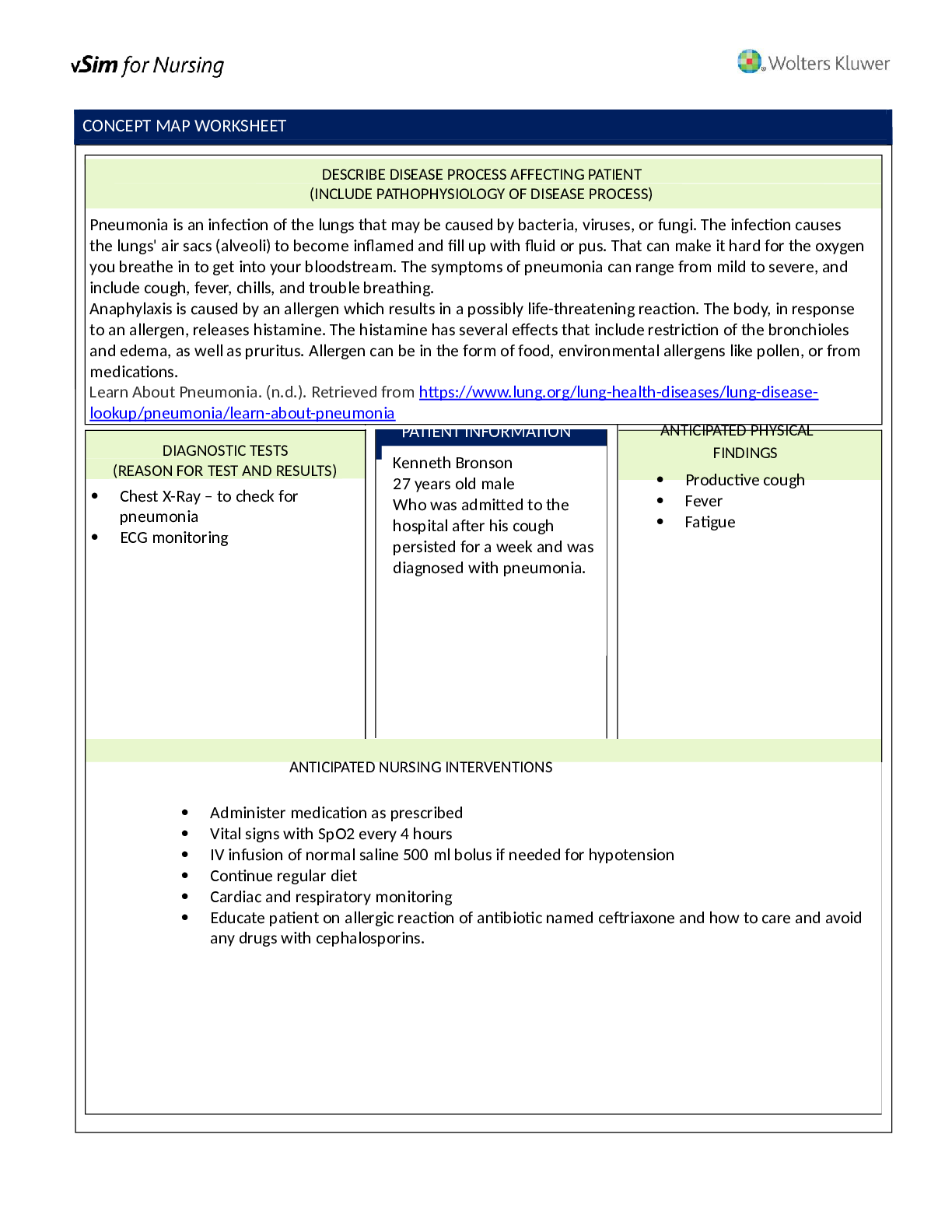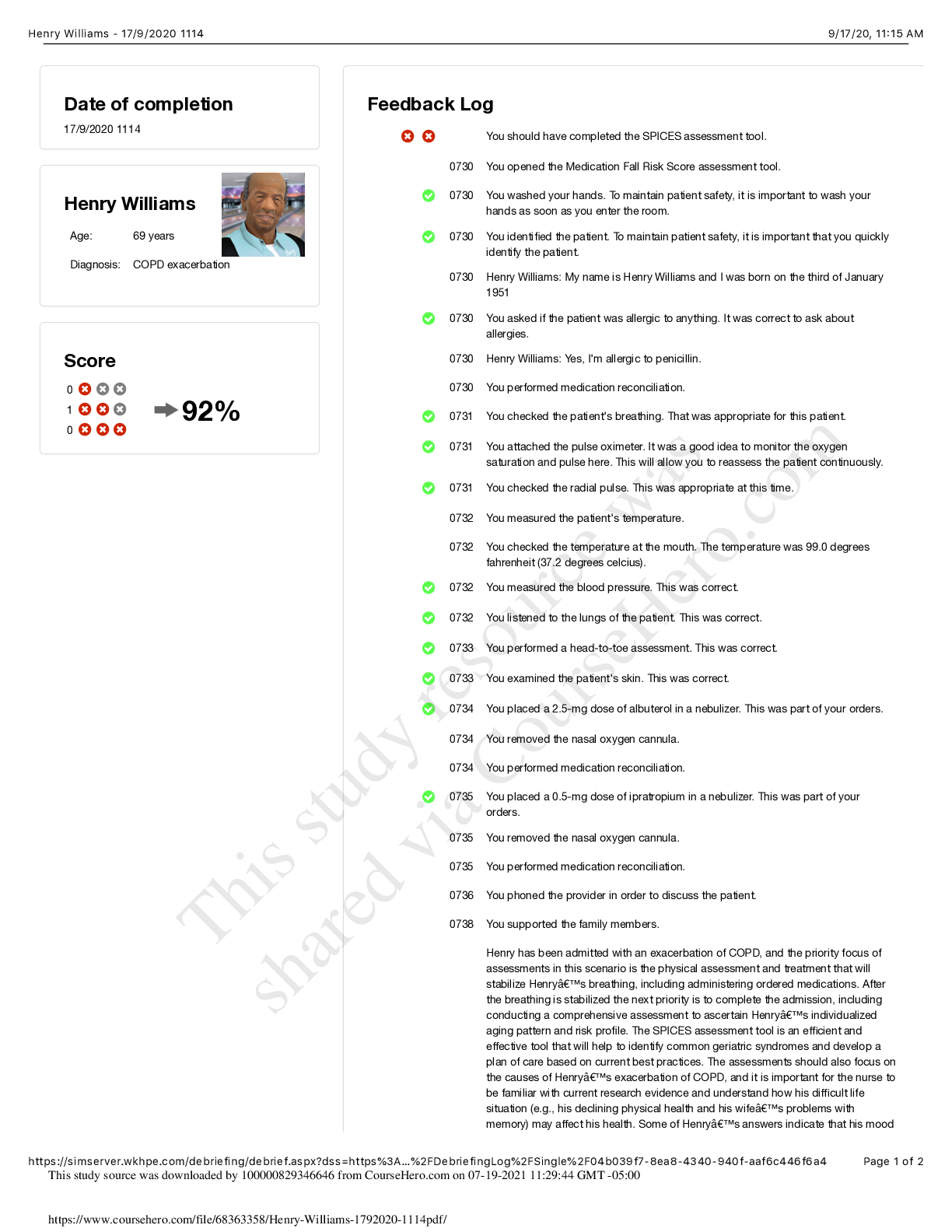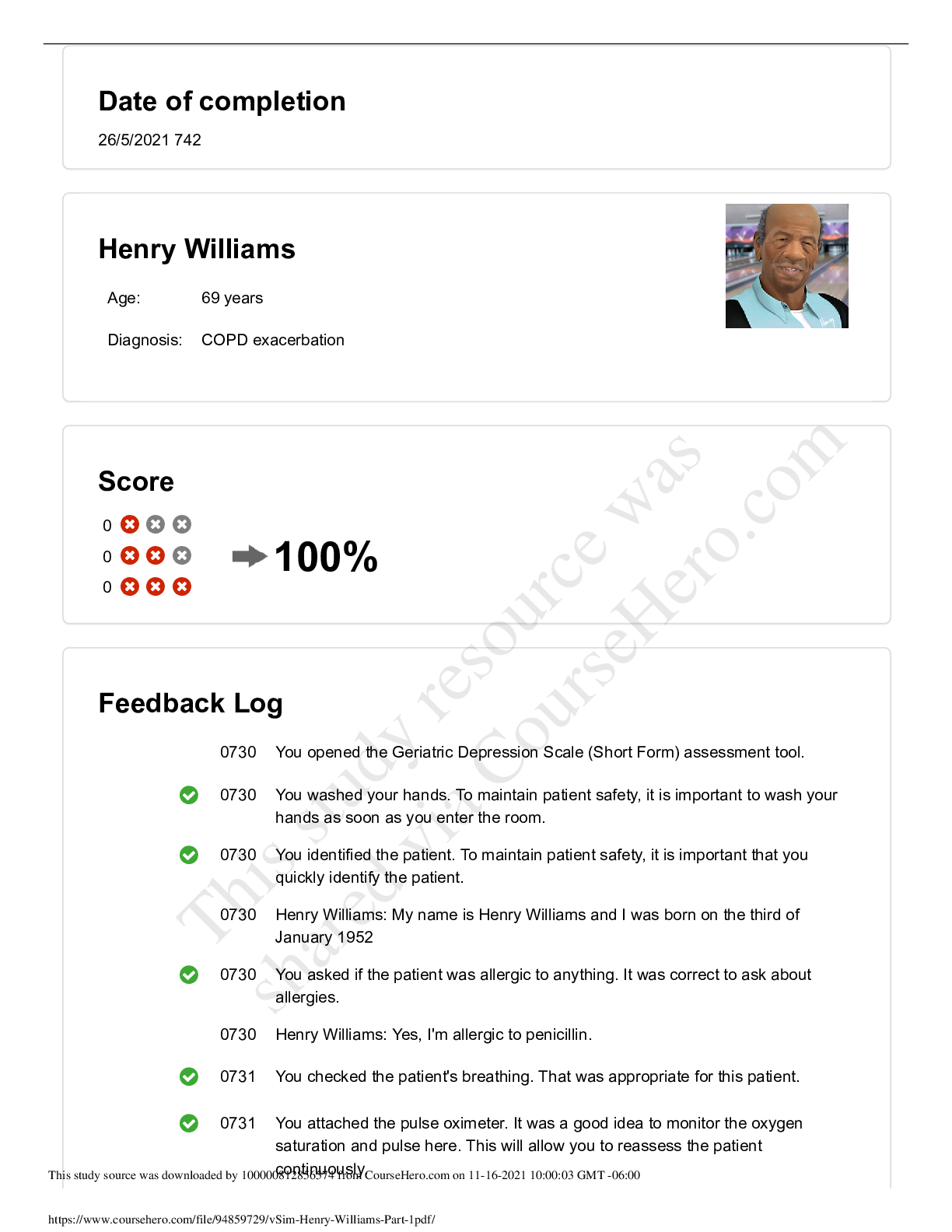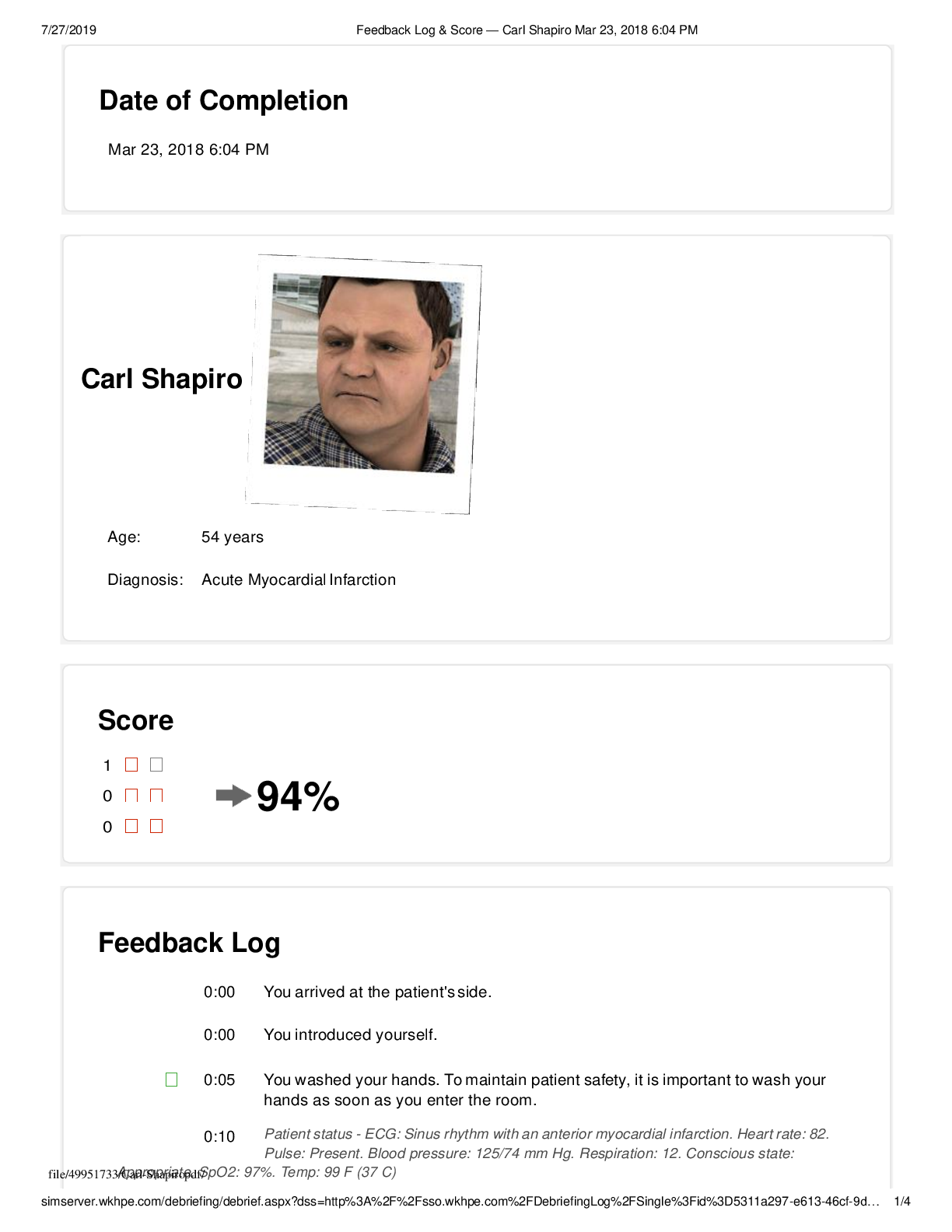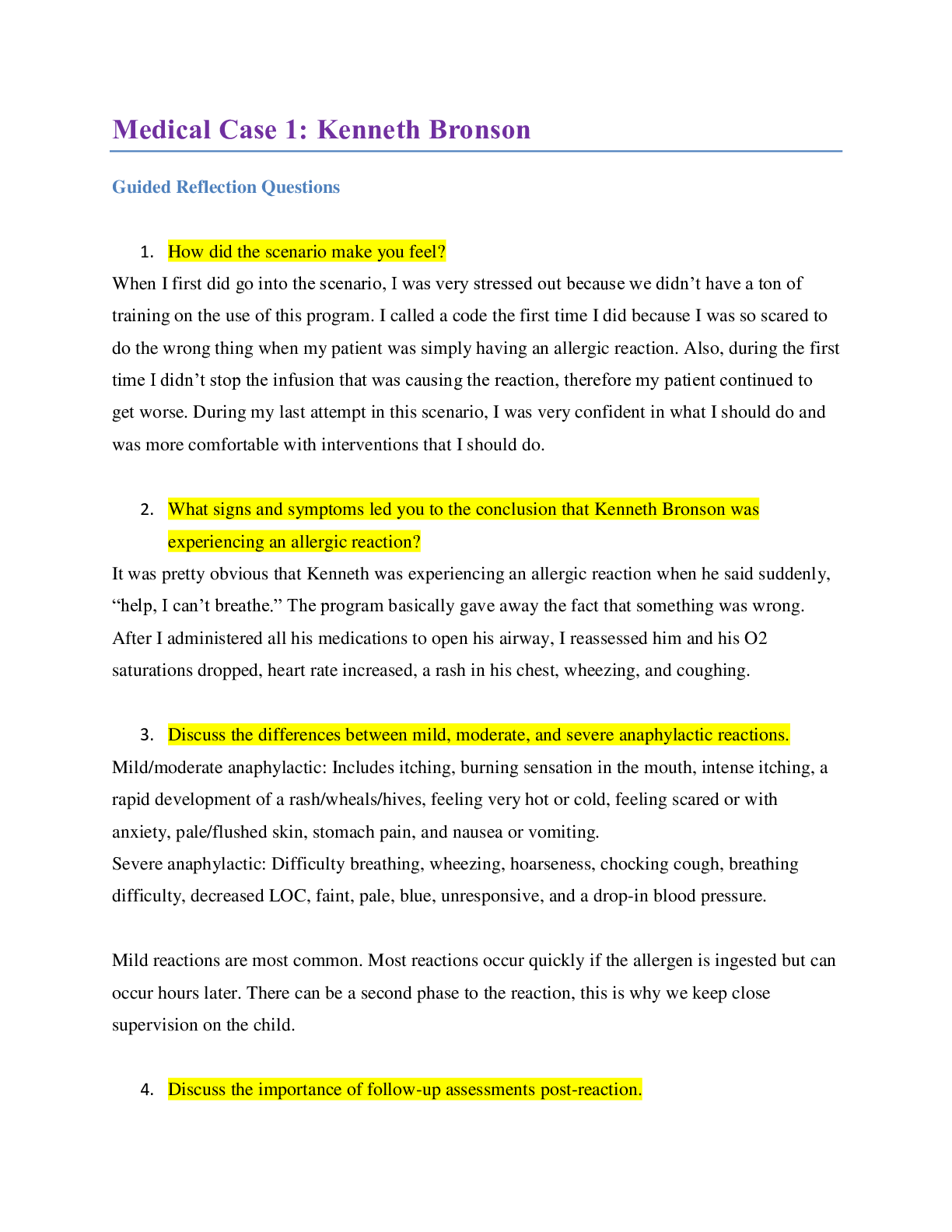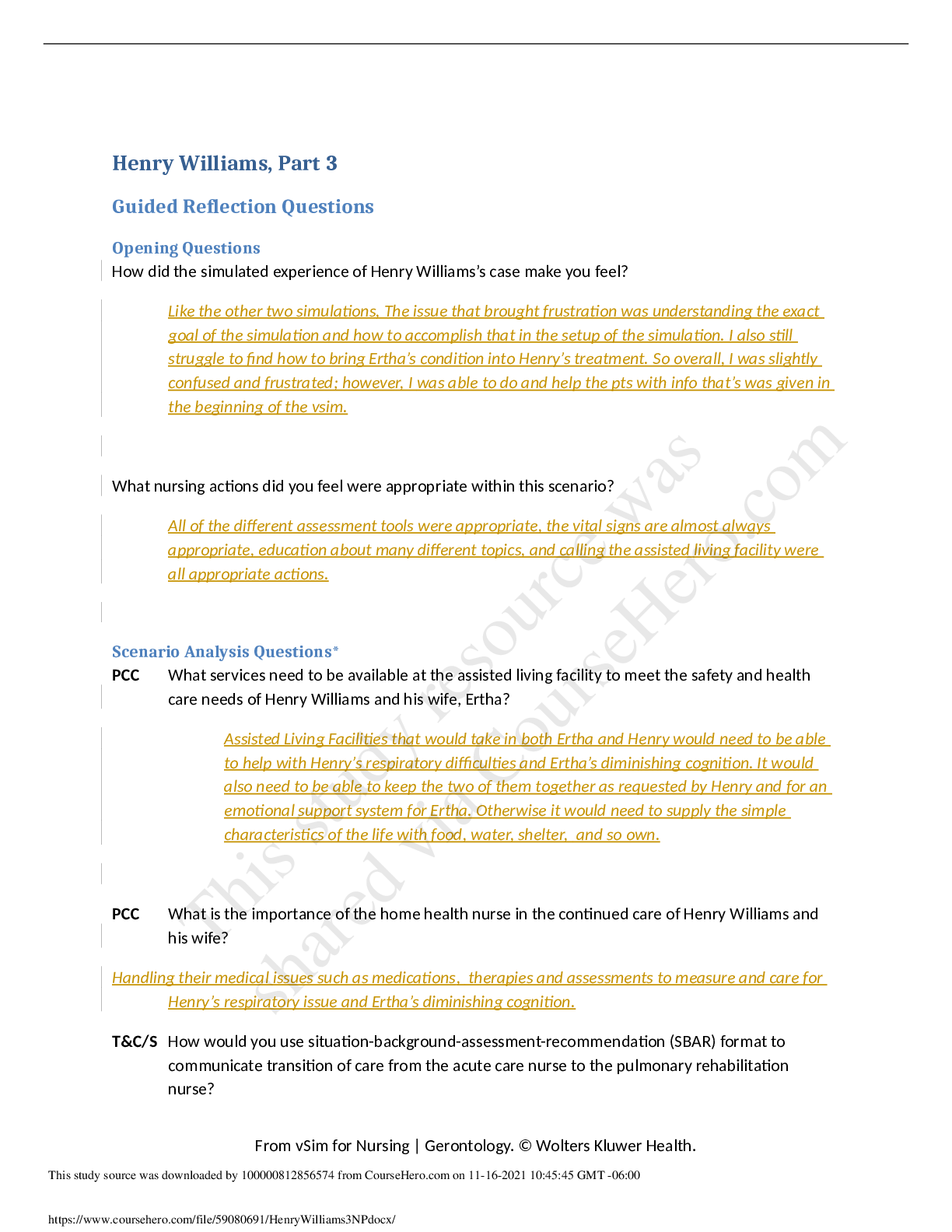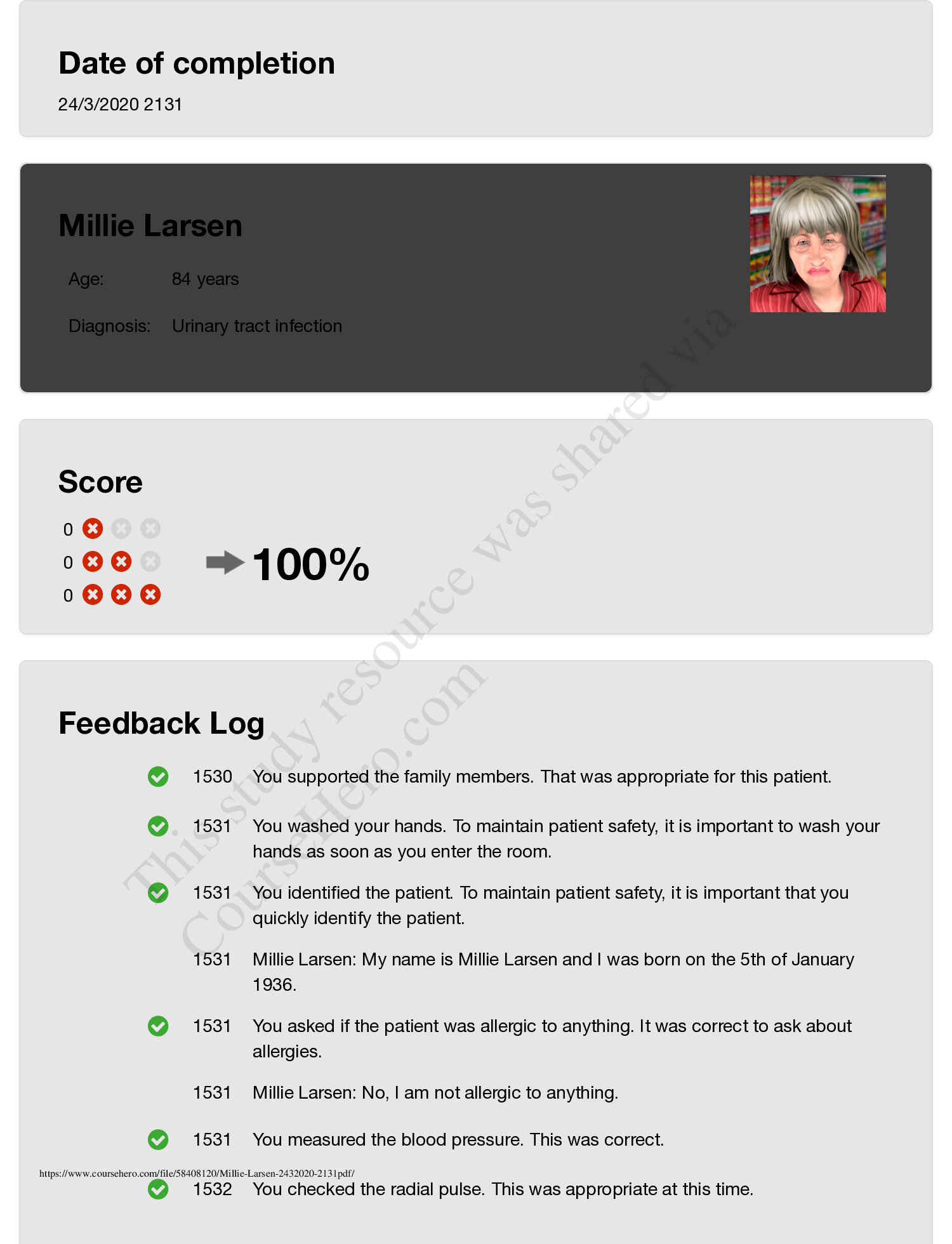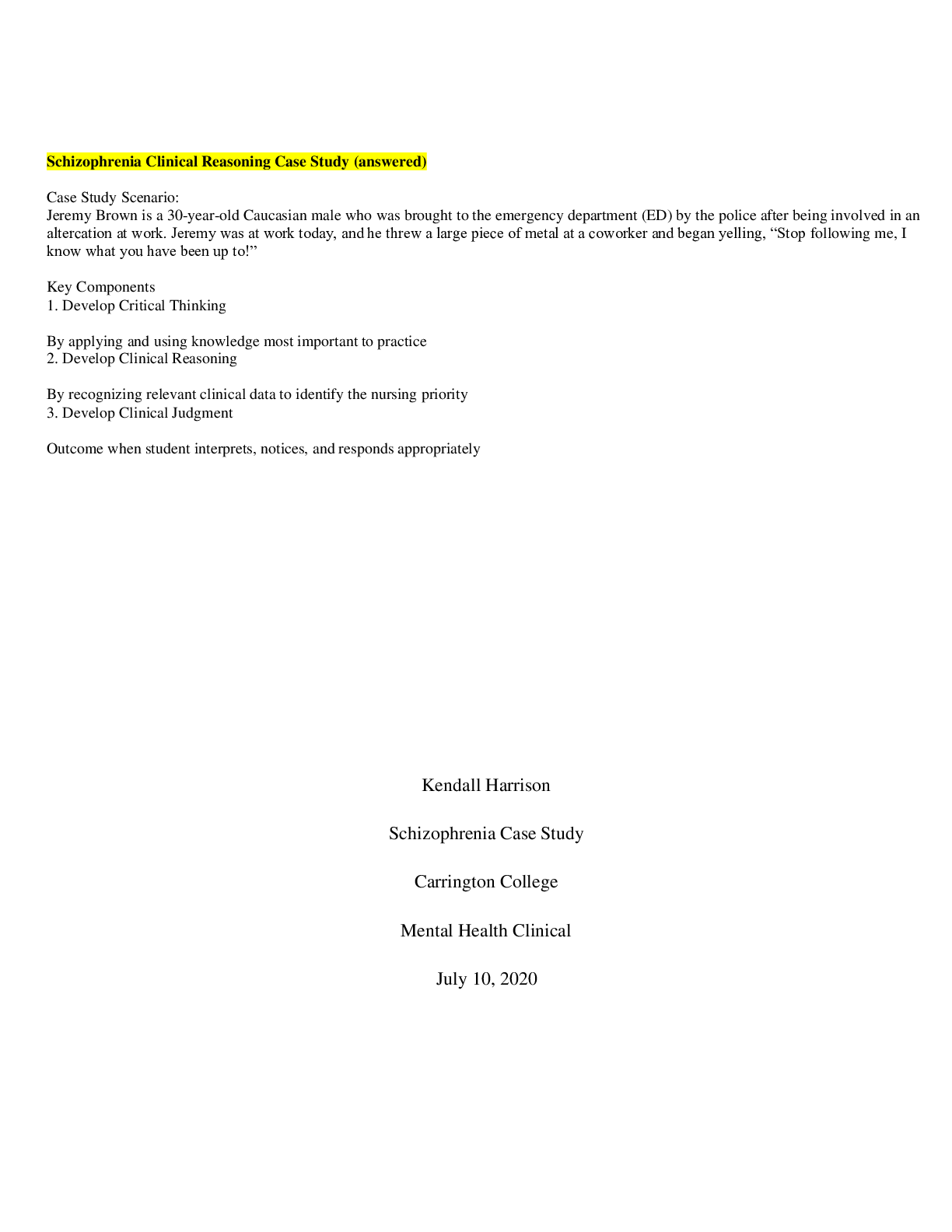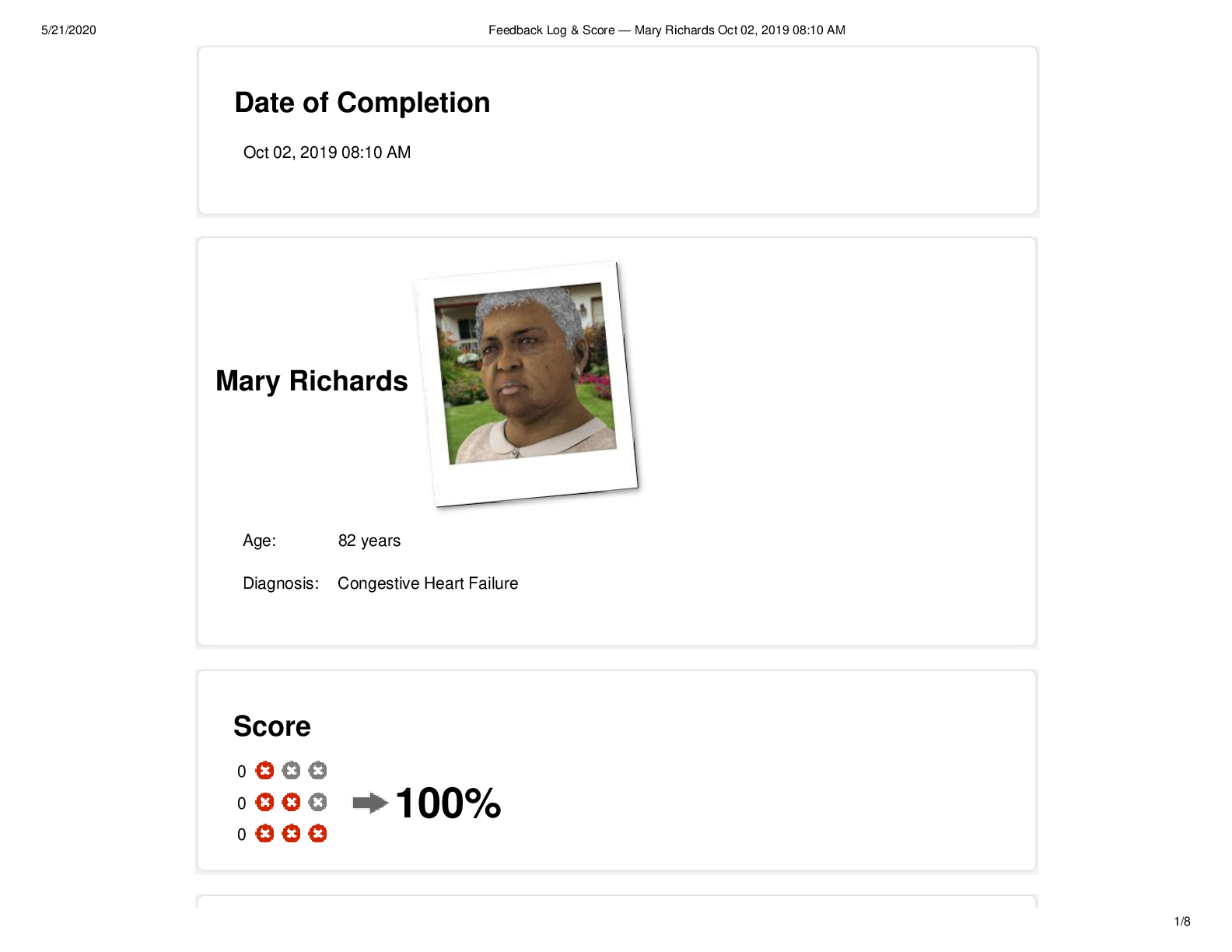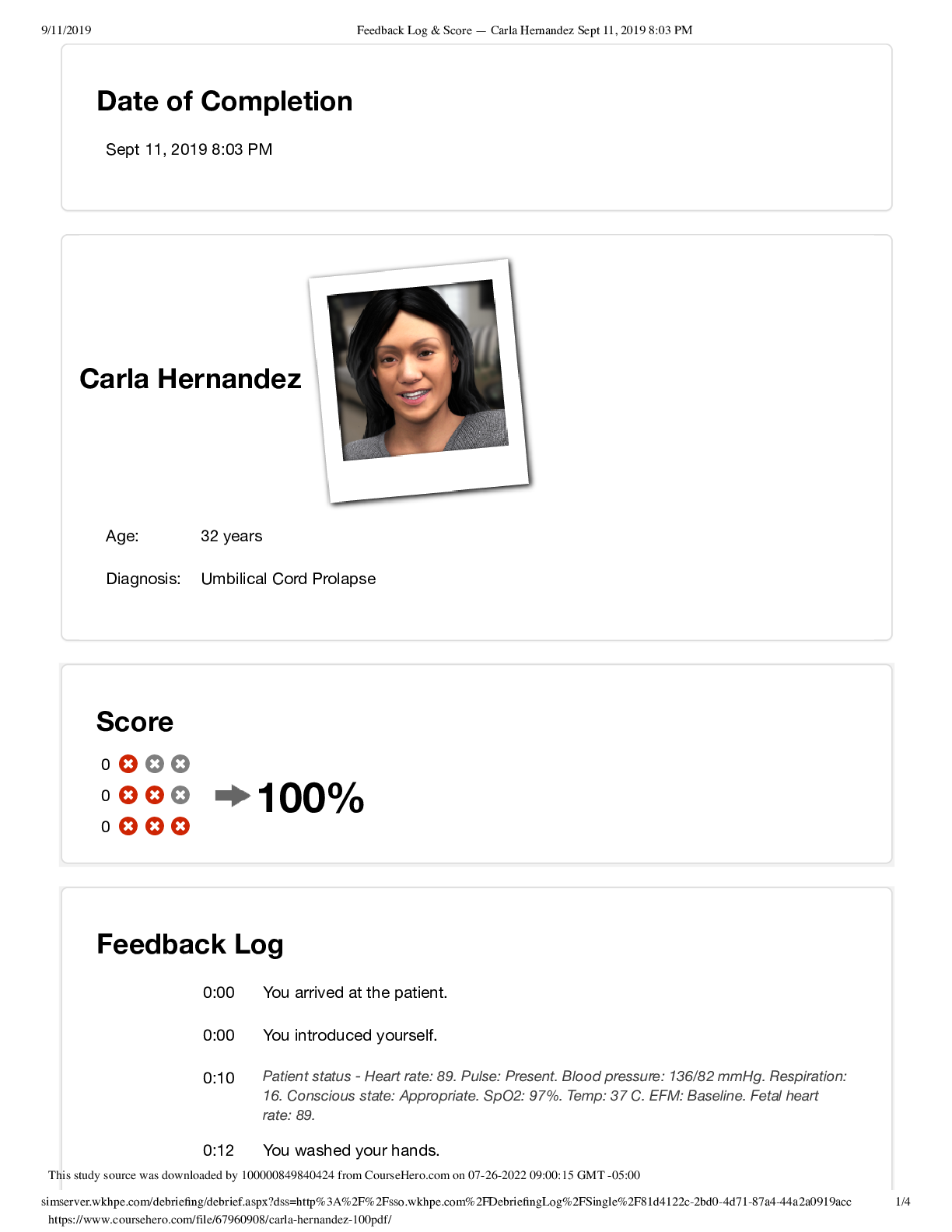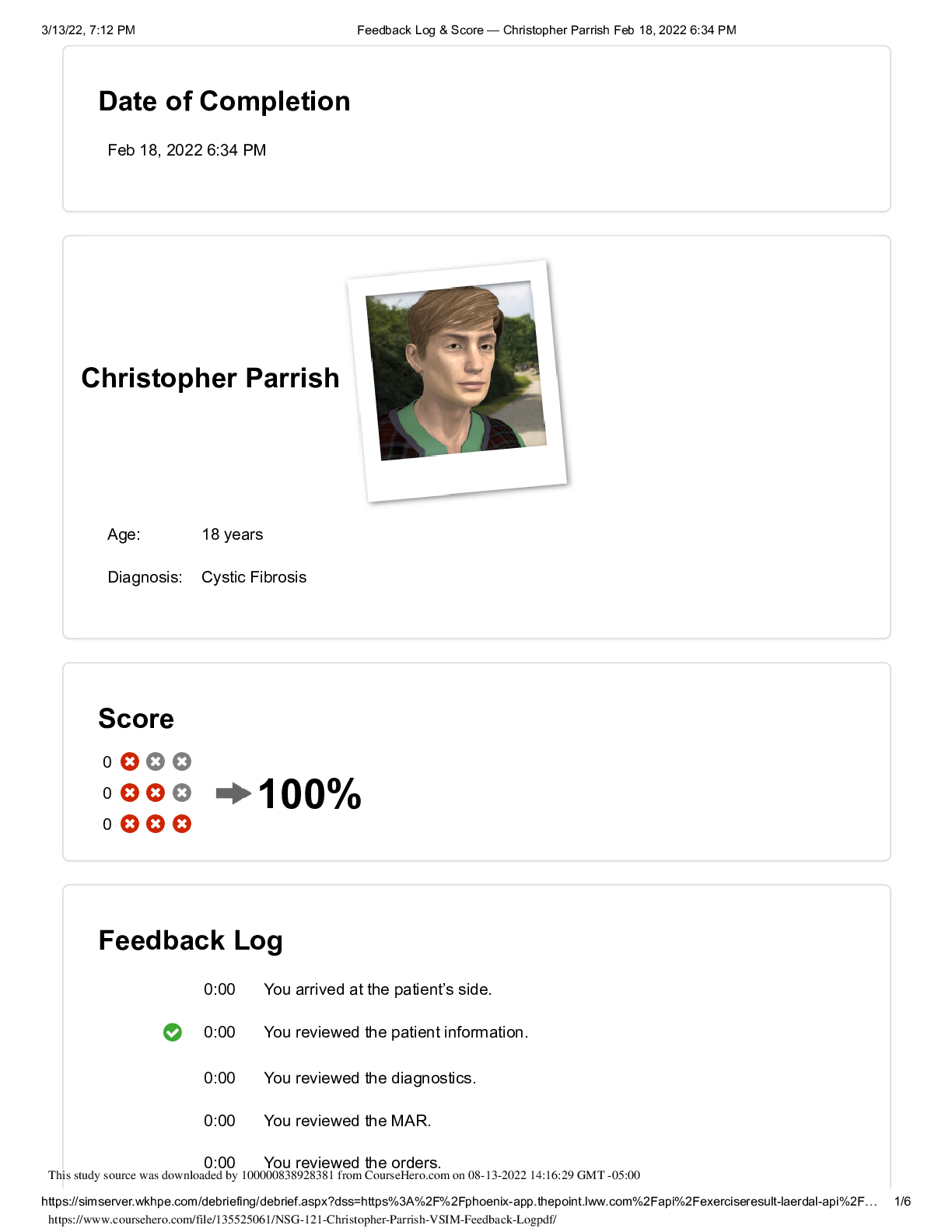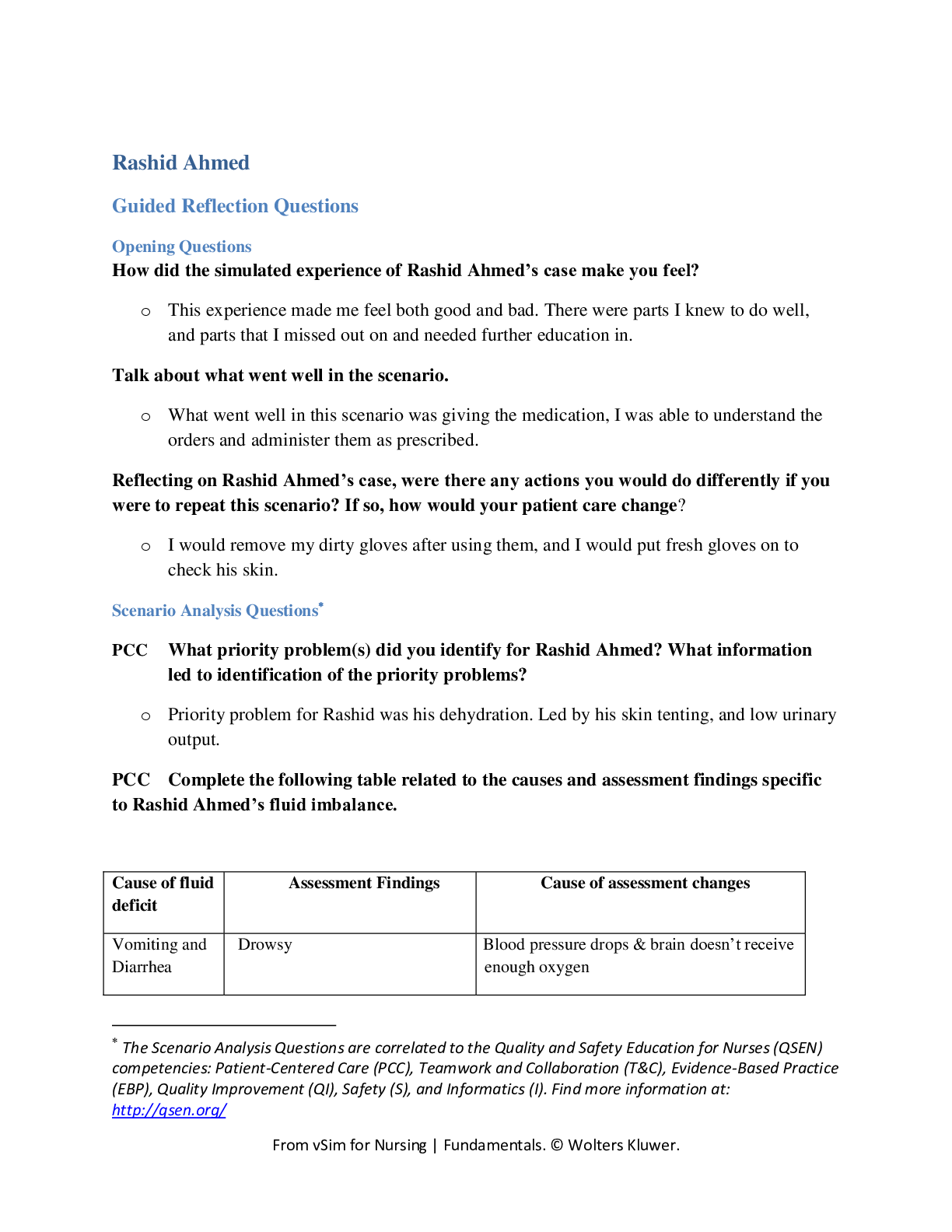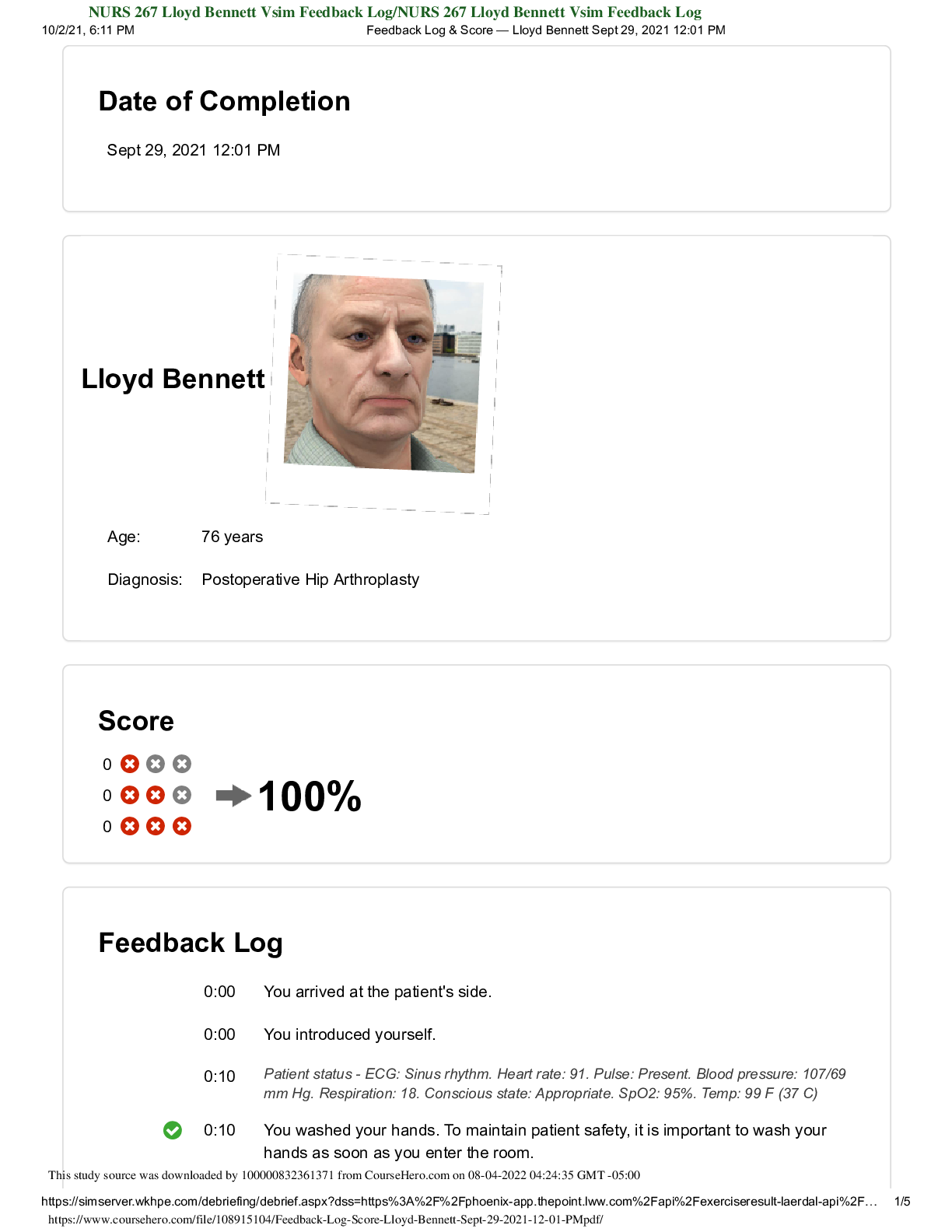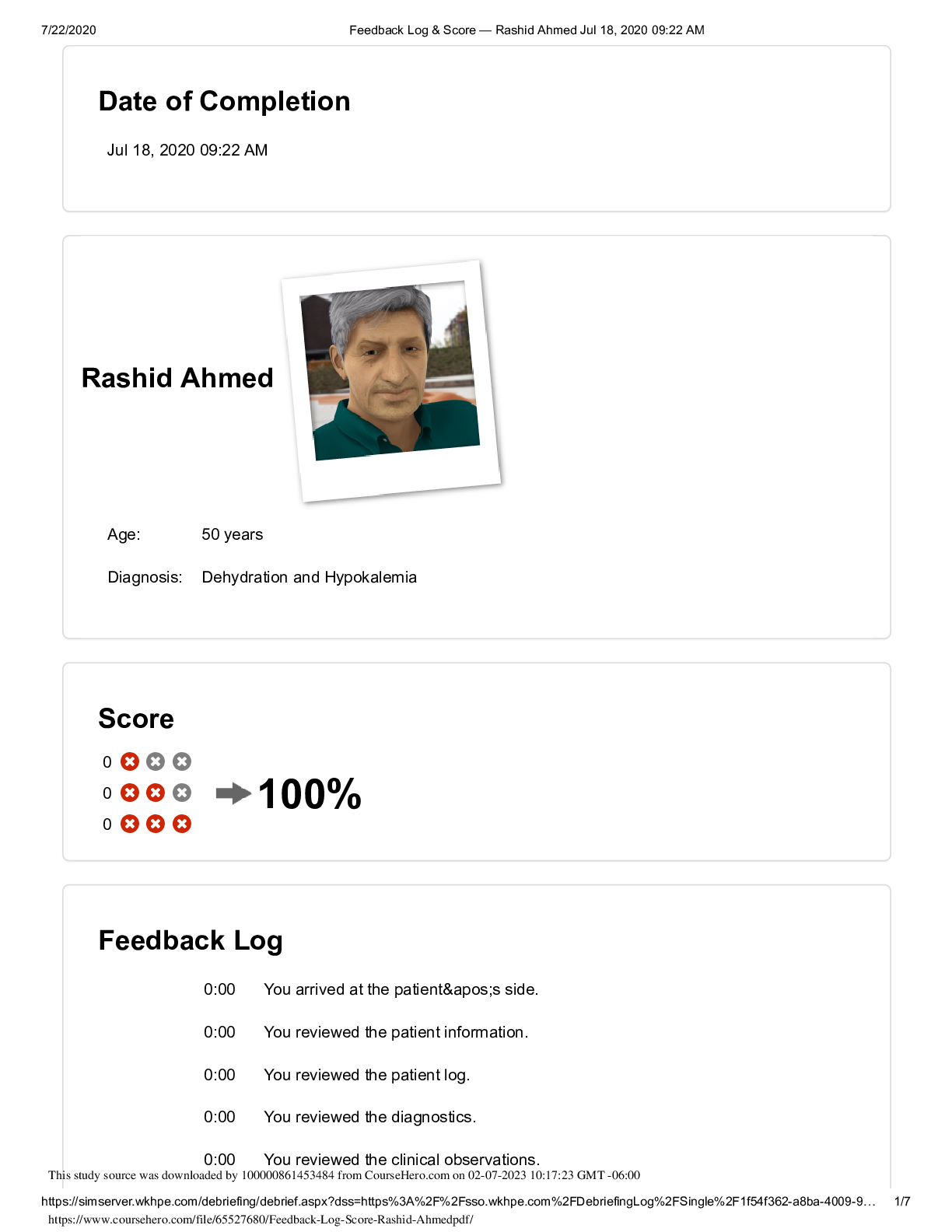*NURSING > vSim For Nursing > vSim for Nursing | Gerontology. Henry Williams. NURSING 1000-1800 Henry Williams Age: 69 years Diagn (All)
vSim for Nursing | Gerontology. Henry Williams. NURSING 1000-1800 Henry Williams Age: 69 years Diagnosis: COPD exacerbation. Feedback Log. Scored 82%.
Document Content and Description Below
Henry Williams - 17/9/2020 1413 9/17/20, 2:14 PM https://simserver.wkhpe.com/debriefing/debrief.aspx?dss=https%3A…%2FDebriefingLog%2FSingle%2F39a82f46-8e8a-475f-82ea-e79b0655c61d Page 1 of 2 Feedb... ack Log You should have educated the patient about family involvement. You should have asked Henry questions regarding his wife, Ertha's, condition. 1653 You washed your hands. To maintain patient safety, it is important to wash your hands as soon as you enter the room. 1653 You identified the patient. To maintain patient safety, it is important that you quickly identify the patient. 1653 Henry Williams: My name is Henry Williams and I was born on the third of January 1951 1653 You asked whether the patient was allergic to anything. 1653 Henry Williams: Yes, I'm allergic to penicillin. 1653 You performed medication reconciliation. This was correct. 1654 You educated the patient about the use of medication. That was appropriate for this patient. 1655 You checked the patient's breathing. That was appropriate for this patient. 1655 You attached the pulse oximeter. It was a good idea to monitor the oxygen saturation and pulse here. This will allow you to reassess the patient continuously. 1655 You checked the radial pulse. This was appropriate at this time. 1655 You measured the blood pressure. This was correct. 1656 You examined the patient's skin. This was correct. 1656 You performed a Get-Up and Go test. 1657 You educated about family support. 1657 You educated the patient about sleep. 1658 You educated the patient about next steps. 1658 You educated the patient about Ertha's condition. 1659 You educated the patient about discharge. That was appropriate for this patient. 1700 You supported the family members. 1700 You opened the Geriatric Depression Scale (Short Form) assessment tool. 1701 You completed the Geriatric Depression Scale assessment tool, and your interpretation of the patient was correct. 1701 You opened the The Pittsburgh Sleep Quality Index (PSQI) assessment tool. 1702 You said 'During the past month, how often have you had trouble sleeping and not been able to fall to sleep within 30 minutes?' 1702 Henry Williams: I would say about once or twice a week. 1703 You said 'How often do you have to get up from sleeping to use the bathroom?'. A better alternative could be 'During the past month, how often have you had trouble sleeping because you had to get up to use the bathroom?' 1703 Henry Williams: I would say... about once or twice a week. 1703 You said 'How often do you have difficulty breathing in your sleep?'. A better alternative could be 'During the past month how often have you had trouble sleeping because you could not breathe comfortably?' 1703 Henry Williams: Well, my COPD has been bothering me lately. But, not usually... so ! ! ! " " " " " " " " " " " ! ! Date of completion 17/9/2020 1413 Henry Williams Age: 69 years Diagnosis: COPD exacerbation Score 4 1 0 82% ! ! ! ! ! ! ! ! ! https://www.coursehero.com/file/68362803/Henry-Williams-1792020-1413pdf/ This study resource was shared via CourseHero.com Henry Williams - 17/9/2020 1413 9/17/20, 2:14 PM https://simserver.wkhpe.com/debriefing/debrief.aspx?dss=https%3A…%2FDebriefingLog%2FSingle%2F39a82f46-8e8a-475f-82ea-e79b0655c61d Page 2 of 2 once a week. 1703 You said 'During the past month how often have you had trouble sleeping because you cough or snore loudly?' 1703 Henry Williams: On occasion, I cough at night... I guess it's around once a week. 1704 You said 'During the past month how often have you had trouble staying awake while driving, eating meals, or engaging in social activity?' 1704 Henry Williams: I try to stay awake and watch Ertha... but I have dozed off a couple of times when I am sitting in my chair. I think it happens less than once a week. 1706 You said 'Have you lost your enthusiasm and had trouble getting things done lately?'. A better alternative could be 'During the past month, how much of a problem has it been for you to keep up enthusiasm to get things done?' 1707 Henry Williams: I have this problem quite a bit... about three or more times a week... I just don't have the same energy for things. 1707 Henry Williams: I have this problem quite a bit... about three or more times a week... I just don't have the same energy for things. 1707 You completed the Pittsburgh Sleep Quality Index ( PSQI ) assessment tool, and your interpretation of the patient was correct. 1707 You called the rehab center. Henry has a chronic condition and will have to make life transitions to maximize his declining respiratory function and maintain as much independence as possible. There are signs that he has difficulty coping with the situation. The nurse should be able to recognize these signs and perform appropriate assessments. Using evidence-based standardized assessment tools will help to ensure a comprehensive approach to the assessments. In this case, relevant assessment tools include the Geriatric Depression Scale and the Pittsburgh Sleep Quality Index (PSQI). Henry is worried about his wife, Ertha, and about whether his daughter-in-law, Betty, will be able to take care of Ertha during his stay at the rehabilitation center. It is important for the nurse to understand that older adults are vulnerable during transitions and should assist the family in accessing knowledge and evaluating resources that can help improve their life situation. Henry and Betty should be involved in making decisions about appropriate changes for him and Ertha (e.g., the discharge to the rehabilitation center and Betty’s ability to take care of Ertha in the meantime). The important life decisions that have to be made are the sources of Henry’s anxiety, and it is important to assist the family with these decisions, address Henry’s and Betty’s concerns, and support them with education about medication, family involvement, discharge plans, and most notably the care and concern for Ertha. During transitions it is also important to coordinate care and ensure continuity of care as the older adult transitions from one care setting to another. Performing medication reconciliation, contacting the receiving facility, and verifying arrangements are important elements in this. [Show More]
Last updated: 1 year ago
Preview 1 out of 2 pages
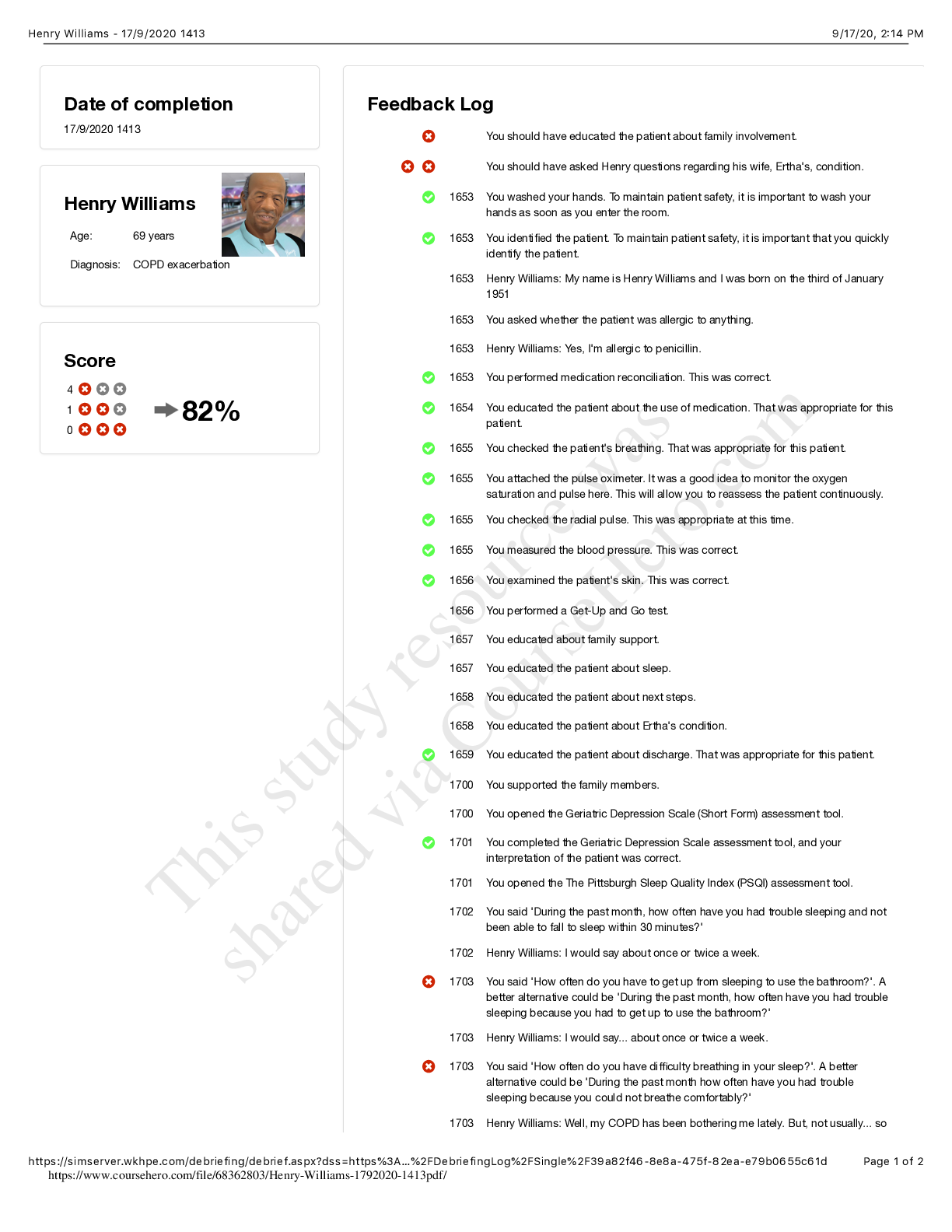
Reviews( 0 )
Document information
Connected school, study & course
About the document
Uploaded On
Mar 22, 2021
Number of pages
2
Written in
Additional information
This document has been written for:
Uploaded
Mar 22, 2021
Downloads
0
Views
422

